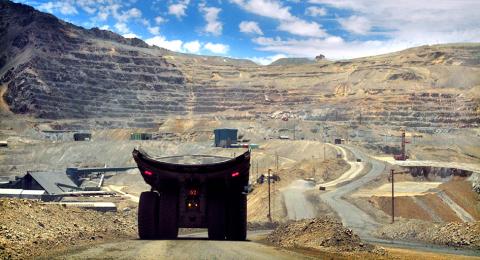Chilean state mining firm Codelco said on Monday it was exercising its option to buy a 49 percent stake in a copper mining venture held by Anglo American PLC in the latest twist of a long legal battle.
Less than two weeks after the London-based firm filed a breach of contract suit against Codelco, the Chilean group — the world’s top copper producer — said it had filed documents with market regulators to exercise the purchase option based on a 1978 contract between the two firms.
It said the British-South African Anglo American group refused to provide enough information for a final price, and that consequently it set the price at about US$6 billion for the unit known as Anglo American Sur (AAS).

Photo: AFP
FINANCE DEAL
Codelco, which announced plans for the purchase in October, has said it would finance it under a deal with Japanese trading house Mitsui.
The legal dispute heated up when Anglo American announced it had sold a 24.5 percent stake in its Chilean copper activities to Japan’s Mitsubishi Corp for US$5.39 billion.
Codelco swiftly filed suit in a bid to guarantee its right to purchase a full 49 percent share of AAS, after the sale to Mitsubishi presumably reduced the stake available.
Anglo American countered on Dec. 22 with a breach of contract suit, saying Codelco had prematurely sought to use its option and prevented the British-based firm from exercising its contractual right to sell to Mitsubishi.
On Monday, Anglo American reiterated in a statement that “it was under no obligation to sell any of AAS shares to Codelco.”
“In line with Chilean legislation and since Codelco did not honor the contract, Codelco does not have the right to exercise its purchase option with respect to Anglo American Sur and therefore any claim to exercise this option is null and void,” the statement said.
WORKING TOGETHER
Anglo American again stressed that it was “open to working with Codelco to find a trade deal in the interest of shareholders of the two companies.”
However, analysts cited by Chilean media said that given the lack of agreement, a protracted legal battle could be expected.
“On average, five years for this type of cases,” said Antonio Gaspar, a professor of commercial law at Diego Portales University in Santiago.
According to the 1978 contract, Codelco has the option every three years to buy up to 49 percent of AAS — and the Chilean mining giant in October announced plans to do that this month.
The deal would give Codelco control of the operations which include the copper deposits known as Los Broncos and El Soldado, as well as the Chagres smelting facility and exploration projects in Chile.

IN THE AIR: While most companies said they were committed to North American operations, some added that production and costs would depend on the outcome of a US trade probe Leading local contract electronics makers Wistron Corp (緯創), Quanta Computer Inc (廣達), Inventec Corp (英業達) and Compal Electronics Inc (仁寶) are to maintain their North American expansion plans, despite Washington’s 20 percent tariff on Taiwanese goods. Wistron said it has long maintained a presence in the US, while distributing production across Taiwan, North America, Southeast Asia and Europe. The company is in talks with customers to align capacity with their site preferences, a company official told the Taipei Times by telephone on Friday. The company is still in talks with clients over who would bear the tariff costs, with the outcome pending further

WEAKER ACTIVITY: The sharpest deterioration was seen in the electronics and optical components sector, with the production index falling 13.2 points to 44.5 Taiwan’s manufacturing sector last month contracted for a second consecutive month, with the purchasing managers’ index (PMI) slipping to 48, reflecting ongoing caution over trade uncertainties, the Chung-Hua Institution for Economic Research (CIER, 中華經濟研究院) said yesterday. The decline reflects growing caution among companies amid uncertainty surrounding US tariffs, semiconductor duties and automotive import levies, and it is also likely linked to fading front-loading activity, CIER president Lien Hsien-ming (連賢明) said. “Some clients have started shifting orders to Southeast Asian countries where tariff regimes are already clear,” Lien told a news conference. Firms across the supply chain are also lowering stock levels to mitigate

NEGOTIATIONS: Semiconductors play an outsized role in Taiwan’s industrial and economic development and are a major driver of the Taiwan-US trade imbalance With US President Donald Trump threatening to impose tariffs on semiconductors, Taiwan is expected to face a significant challenge, as information and communications technology (ICT) products account for more than 70 percent of its exports to the US, Chung-Hua Institution for Economic Research (CIER, 中華經濟研究院) president Lien Hsien-ming (連賢明) said on Friday. Compared with other countries, semiconductors play a disproportionately large role in Taiwan’s industrial and economic development, Lien said. As the sixth-largest contributor to the US trade deficit, Taiwan recorded a US$73.9 billion trade surplus with the US last year — up from US$47.8 billion in 2023 — driven by strong

RESHAPING COMMERCE: Major industrialized economies accepted 15 percent duties on their products, while charges on items from Mexico, Canada and China are even bigger US President Donald Trump has unveiled a slew of new tariffs that boosted the average US rate on goods from across the world, forging ahead with his turbulent effort to reshape international commerce. The baseline rates for many trading partners remain unchanged at 10 percent from the duties Trump imposed in April, easing the worst fears of investors after the president had previously said they could double. Yet his move to raise tariffs on some Canadian goods to 35 percent threatens to inject fresh tensions into an already strained relationship, while nations such as Switzerland and New Zealand also saw increased